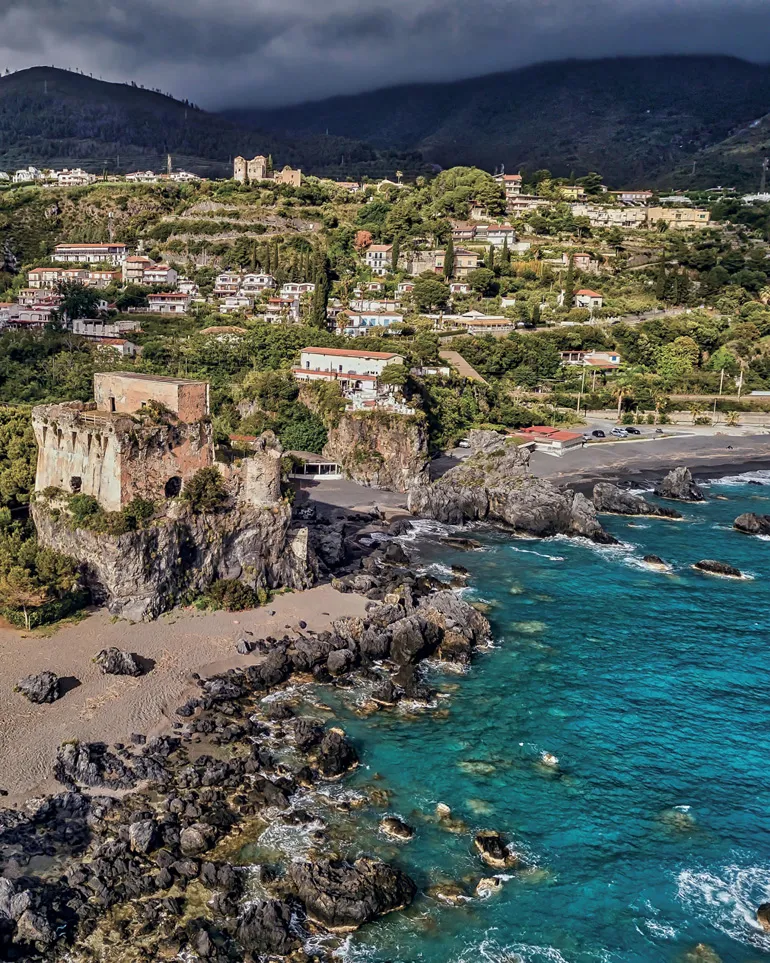![]()
1. Heritage and Memory
Tower of Fiuzzi Praia a Mare
Eloise Carbone: My Doll
I remember the doll
standing tall with eyelids blinking over blue eyes,
arms that moved up and down,
and legs that moved her around the room.
She talked with just a pull of the cord at her back.
She seemed to be as tall as I was, but perhaps not.
I’m not sure where she came from – a gift, a prize –
But I loved her. She was mine.
Her plastic arms were always ready to be held.
This only lasted a few days.
It lasted until my mother told me that she gave away my doll
Because others needed her more than I.
I cried for that doll. I cried for myself.
Left alone.
Eloise Carbone: Salt Over the Shoulder
We sat on the piano bench as the hired photographer directed us, looking for the best angle.
The portrait was of Lou, my eldest brother; of Martin, the second; of Julia, my sister; and of me. Monochrome, with hand brushed tints of pastel pinks and blues, the portrait hung in our hallway in an ornate frame larger than life, year after year, even after a fifth child was born and a sixth adopted. It hung there until our parents were gone and the house was sold.
Who would have thought that our lives would be shattered? That the fighting, the anger, and the displacement of our grandparents still lingered in our DNA, streaming in our blood?
As children, we didn’t know our father was the designated peacekeeper of his displaced family, always calming their fury. His parents, sheepherder and blacksmith, had left the poverty of Calabria, Italy, and now many years later, were parents to eight children in Canada.
We knew almost nothing about my father’s siblings. We didn’t know Aunt Mary was forced to marry her uncle. We didn’t know that Aunt Theresa abandoned her baby son to flee an abusive marriage, also to an uncle. We never met Aunt Rose, who stole Aunt Lilly’s husband. We never met Aunt Lilly. We knew Uncle Johnny was divorced, and Uncle Sam had married and moved to Quebec. We didn’t know their father had beaten their mother.
What karma we carried!
Now, we siblings don’t sit with each other. We barely speak with each other.
How did I think that throwing away that portrait would wipe away our past?
Salt over the shoulder.
Eloise Carbone: The Truth of My Name
When I was a child, I once heard my parents in their bedroom whispering. There had always been a sense of shame in our family, but this was unusual.
I heard my mom crying, “Tom, you have to tell them!”
My father had just been hired for an engineering job at Camp Petawawa. I had never heard of Petawawa, a military base near Timmins, Ontario.
We hadn’t been told that fifteen years earlier on June 10, 1940, when war was declared between Italy and Canada, my father was interned, imprisoned in Camp Petawawa.
We hadn’t been told about the discrimination against Italians – rocks thrown, slogans painted on walls, curses hurled.
We hadn’t been told that Italian “enemy aliens” were taken to the Canadian National Exhibition grounds in Toronto before they were transferred to Petawawa.
When my sister and I entered a piano competition at the Exhibition ye...

